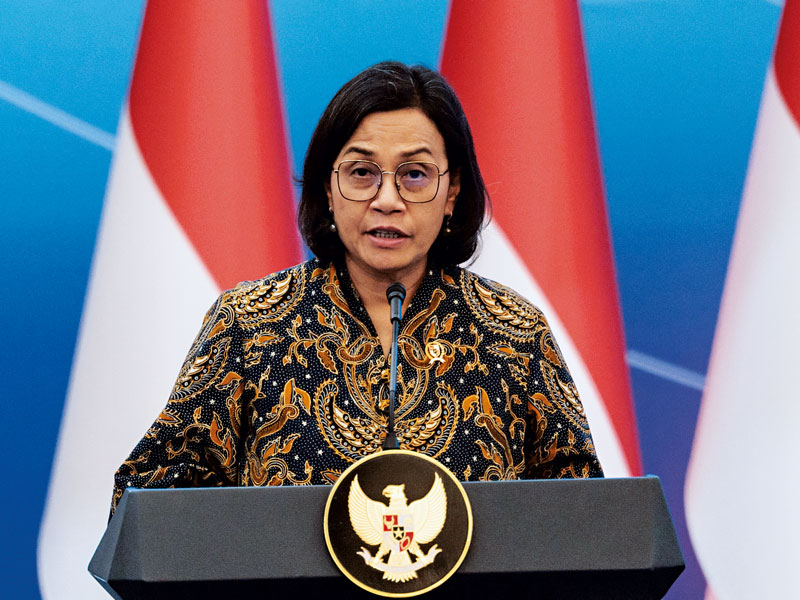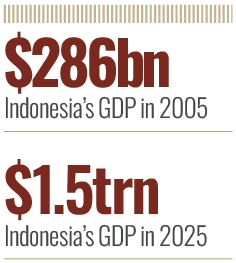
 
Author: Selwyn Parker, Features Writer
Indonesian finance minister Dr. Mulyani Indrawati is the woman the country can’t do without. Regardless of the party in power, she has overseen the nation’s finances for 16 years and it is unlikely that her long-running reign will come to an end anytime soon.
As the Singapore Straits Times wrote recently, she has “long been regarded as one of Asia’s finest finance ministers.” And she is certainly the longest-serving female finance minister. But there is no doubt that the 62-year-old occupies a hot seat. When she first took office 20 years ago, her desk was piled high with much-needed reforms – and it still is. When she was first appointed in 2005, the country’s economy was in tatters. Indonesia had not fully recovered from the Asia-wide financial crisis and had just been battered by a tsunami and earthquakes that required a heavy injection of capital. The cost of reconstruction of the hardest-hit region, Aceh, alone was $4.5bn, albeit some of that amount was funded through grants.
Attracting foreign investment
Natural disasters aside, Dr. Indrawati had plenty on her plate. The biggest bank, state-owned Mandiri, was mired in corruption and the banking sector in general was inefficient. Poverty and unemployment were high. The sprawling finance ministry and Bank of Indonesia was overdue a spring clean. And as the International Monetary Fund reported at the time, one of her top priorities was to implement reforms rapidly and attract foreign investors back to pay for new infrastructure.
Then in 2008 Indonesia was particularly hard-hit by the global financial crisis leading indirectly to the bail-out of an important institution, Bank Century. This turned into one of the longest-running cases in Indonesian financial history. In this highly political event the details are that the privately owned bank was rescued with state funds in a bid to prevent a run on the entire banking sector. It was not until late 2010 that a corruption commission began investigating the rescue amid arguments that, in summary, it may not have been necessary. It was also alleged that some of the $675m rescue funds may have got into the wrong hands. Ultimately, the ruckus led to her departure from office in 2010 for a six-year stint at the World Bank, where she served as chief operating officer and deputy managing director. It was the World Bank’s gain and Indonesia’s loss.
Productivity-driven, private sector-led growth is the cornerstone of job creation in all countries
By then though, Dr. Indrawati had already made a big impression on the economy. In her first five years as finance minister she was fortunate to take office under the reform-minded president Susilo Bambang Yudhoyono, who supported the new broom. As the IMF reported, “the new president has continued and deepened these policies, notably by maintaining a restrained budget stance, replacing managements in state banks in a bid to improve governance, and taking steps to enhance the investment environment.”
Most importantly, Dr. Indrawati knew that the potential of her country of about 285 million people, making it the fourth-highest populated country in the world located in the heart of the fast-growing ASEAN region, was high. It just had to be funded and harnessed.
Nearly 20 years later, she has been back in the job for a decade and the proof is there for all to see. Indonesia’s economy has been thoroughly overhauled. Debt has been slashed and borrowing costs have consequently declined. Meanwhile, the nation’s wealth as measured by gross domestic product has increased six-fold, jumping from $286bn in 2005 and is heading to nearly $1.5trn by the end of 2025. Though still one of Indonesia’s biggest government departments, the finance ministry has been streamlined. And as corruption has declined and opportunities increased, foreign investors have returned.
Challenging landscape
It has been a long and sometimes uphill battle. In 2017, just after Dr. Indrawati returned to the job after her six-year period of service at the World Bank, a research paper from the OECD concluded Indonesia still had some way to go: “The quality of public governance, as measured by the World Bank estimate of government effectiveness, puts Indonesia well behind countries like the Philippines, Thailand, Malaysia, Vietnam and Singapore.”
She ensured that women were at the forefront of dragging a nation out of economic mediocrity
To put things into perspective, Indonesia faced unique challenges. With the population growing by about three million a year, the strain on public finances was considerable – and remains so. Also, people were pouring into the cities at one of the highest rates in the region, which required huge expenditure on infrastructure. Simultaneously, in a far-flung nation, money had to be found for remote poorer communities that needed “basic public services such as sanitation, water, education and health,” the OECD explained.
The dearth of infrastructure was particularly damaging. “Indonesia’s competitiveness (ranked 41st out of 140 countries) is dragged down by the poor quality of its infrastructure (60th),” pointed out a 2016 report by the World Economic Forum, citing shortages of electricity for industry, inadequate transport, insufficient number of airports and sea ports, and congested road and rail networks.
Reach for the stars
An economist with a humane view, Dr. Indrawati identifies with these poorer communities. She hails from relatively humble origins. Born in the Lampung region on the southern tip of the mountainous island of Sumatra to a large family, she attended a mixed public school where, she said in an interview several years ago, the girls never suffered discrimination and were encouraged to ‘reach for the stars.’ And they did; one of her school friends, Retno Marsudi, served for 10 years as Indonesia’s first female foreign minister.
“If one school can produce the first female finance minister and the first female foreign minister in this republic, then our alma mater and its educators must be doing something right,” recalled Indrawati some 40 years later. A diligent student, she went on to obtain a Bachelor of Economics in the University of Indonesia before embarking for the US, where she picked up a master’s degree in policy economics and a PhD from the University of Illinois. She has never forgotten the value of the good start in life that her school gave her – today about 20 percent of the national budget is allocated to education.
A firm believer in private enterprise, Indrawati has done all she can to encourage it in a country that had long suffered from a heavy-handed bureaucracy and state-run companies. And from the outset she ensured that women were at the forefront of dragging a nation out of economic mediocrity. In just one example, when she first took office, she established a simple formula in all new appointments at the ministry: at least one woman must be included in every 10 promotions.
“So they were forced to look for female candidates,” she recalled just before leaving the World Bank and returning to her old job. “Good jobs are the surest pathway out of poverty.” That is partly why nearly half of all Indonesia’s small and medium-sized enterprises were jump-started by women.
“Although women’s participation in the formal sector only reaches 32 percent, their contribution in job creation through SMEs is very significant,” she pointed out. Indonesia likely has more female entrepreneurs than any other country in the world. This is surely a model for other rising nations. As numerous studies show, as much as 30–50 percent of the fall in poverty in the decade to 2025 is attributable to rising wages. However much needs to be done. More than 200 million people worldwide are unemployed and looking for work – and many of them are young and/or female. Echoing Indrawati’s view, one study argued: “Therefore to end poverty and promote shared prosperity we will need not just more jobs, but better jobs that employ workers from all walks of society. Where to start? Productivity-driven, private sector-led growth is the cornerstone of job creation in all countries.”
To make this happen, good infrastructure such as roads, telecommunications and electricity are seen as fundamental. In India, for example, a study showed that “building roads to villages increased the number of people moving from agricultural work to higher-paying jobs by 10 percent.” Indonesia is in much the same position.
Ambitious and expensive plans
Meanwhile there is still a lot to do for Dr. Indrawati and the Indonesian government under new president Prabowo Subianto, the third under whom she has served. And there appears to be tension between the long-serving finance minister and the retired army general. Subianto is in a hurry. He wants the economy to grow at eight percent a year towards the end of his five-year term and has ambitious – and hugely expensive – plans that include free food for 83 million school pupils and pregnant women as soon as the end of 2025 as well as the creation of vast rice and sugar cane farms that would enable Indonesia to be more self-sufficient.
The markets have taken fright at the cost of these programmes and, reportedly, his finance minister is resisting. “Speculation grew that Dr Indrawati could resign, with whispers suggesting that she could be replaced by one of three people, including her deputy at the Finance Ministry – Prabowo’s nephew, Thomas Djiwandono,” wrote the Singapore Straits Times. So far Dr. Indrawati is standing firm. “I am not resigning and will continue my role in safeguarding state finances,” she told a news conference recently. “We are here, we are responsible.”
The president’s office hastily denied any talk she would be replaced. But if it does come to a battle, one of the region’s most able finance ministers surely holds all the cards.